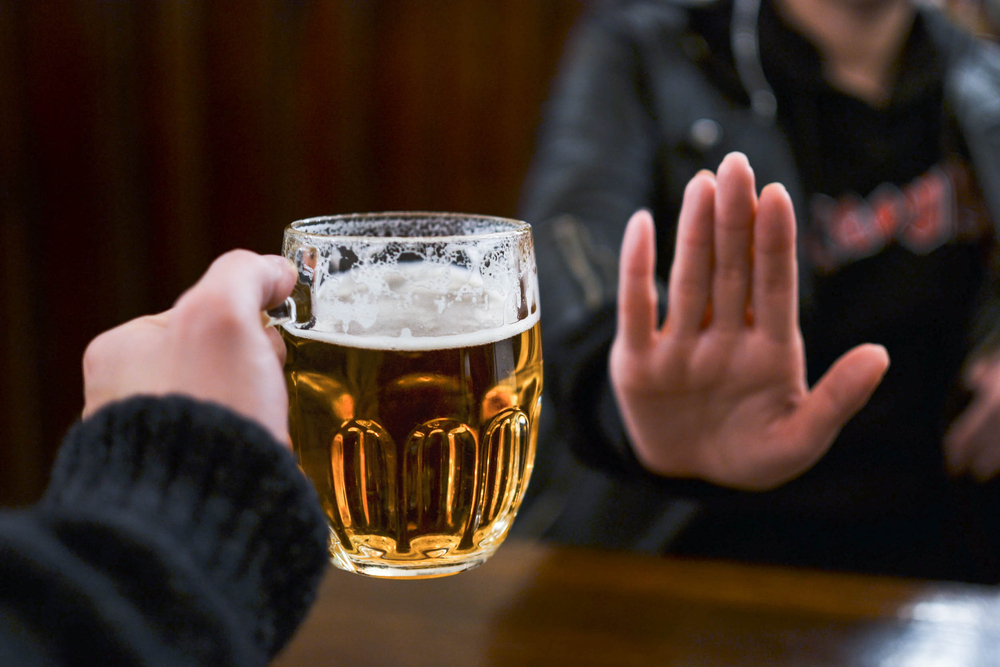Last Updated:
September 18th, 2025
Perhaps the toughest part of addiction is that we often know deep down that we need to stop. But the very nature of addiction makes stopping the difficult part. Clinicians have been explaining alcohol addiction as a chronic condition for decades. Understanding addiction as a disorder highlights that addiction isn’t a choice; no one decides to develop an addiction. Rather, they occur when people become trapped in cycles of alcohol abuse.
But this doesn’t mean that all hope is lost. Whilst we don’t choose to have an addiction, we can choose to take steps towards controlling it. By tackling addiction directly, we make progress towards sobriety. A lot of the time, this does take patience, perseverance, and willpower. But this doesn’t mean that it is impossible. So, if you are tackling an alcohol addiction, there are things to do to help you to stop drinking. These range from large, life-long goals to small daily changes. Together, these shifts can help reconfigure your relationship with alcohol.
How do I know if I have an addiction?
The first step towards sobriety is coming to accept that you have lost control over your drinking. If this realisation doesn’t take place, then it can be difficult to recognise the depth of your relationship with alcohol fully.
Self reflection
The first stage of healing is becoming aware. Awareness comes from honest self-reflection. Whilst introspection isn’t always comfortable, it is a necessary evil on the journey to sober living. So, to begin your path to stop drinking, you can begin by honestly answering the following:
Have you ever:
- felt you should cut down on your drinking?
- been annoyed by people criticising your drinking?
- felt bad or guilty about your drinking?
- had a drink first thing in the morning to steady your nerves or to get rid of a hangover?
These questions are part of an addiction screening tool used by medical professionals. If you answer yes to two or more of these questions, your alcohol use is ‘clinically significant.’
Being informed
A lot of what we see about drug and alcohol problems is filtered through the media. This means that generally speaking, there are lots of myths and stereotypes about addiction in our public consciousness. This can be harmful, as it can act to mystify what addiction really is and allow many people’s drinking problems to fly under the radar.
When this happens, you may be classed as a ‘high-functioning alcoholic.’ This means that you are effectively able to mask your alcohol problems. High-functioning alcoholics are more likely to ‘avoid detection,’ meaning that they are less likely to understand themselves as having a problem. This can delay access to the right kind of treatment and support, and lead to your relationship to alcohol deepening, becoming more insidious over time.
To combat this, we need to acknowledge the truth of addiction. This means informing ourselves of the symptoms – as experienced in real life, not as depicted in film and TV.
The core symptoms of alcohol addiction often include:
- Loss of control
- Failed attempts to stop or cut down
- Social withdrawal
- Worsened mental health
- Worsened physical health
- Reduced attention to personal and professional responsibilities
- Cravings
- Poor sleep
If you have found that you are drinking more heavily (either in strength or quantity) more frequently, at socially unacceptable times, but feel powerless to stop it – then you are more than likely experiencing an addiction.
At this stage, the best action is to take tangible steps towards reducing your drinking.
Strategies for change
With reducing drinking, different things work for different people. Often, it is not one magical cure that helps people cut down but rather a mix of well-targeted strategies. But there are a few cornerstones of recovery that you can begin to implement to help you stop drinking.
These include:
- Be honest
- Try not to hold judgement
- Make a positive routine
- Write down your reasons for stopping
- Build a supportive community
- Assess potential triggers
- Access formal support
Be honest
Being honest means being truthful with yourself as well as with others. Hiding your behaviour can be harmful as it often backfires. By being honest about your drinking patterns, you can build a plan on how to make progress realistically. Being deceitful or denying your reality will only work to impair your ability to progress towards a better relationship with alcohol.
Try not to hold judgement
In England, an estimated 602,391 people are dependent on alcohol. If you are struggling with heavy drinking, it may be helpful to know that you are not alone. Lots of people struggle with complex emotions around their substance use. A lot of these feelings come from judging ourselves too harshly. Issues with alcohol do not equate to personal deficits, and you do not need to make yourself feel awful for finding it hard. In fact, doing so can lead you to feel increasingly depressed and, therefore, turn to alcohol more and more. By being kinder to yourself, you are more likely to make progress.
Make a positive routine
Bad habits can tend to seep in when we are feeling lost or out of control. In order to regain a sense of ownership, creating a positive routine that incorporates elements of socialising, wellness and personal interests can lead us to feel more motivated and boost our mood.
Write down your reasons for stopping
Recovery isn’t easy, and it also isn’t linear. By jotting down your main reasons for stopping drinking, you can have a physical document to return to if and when you waver in your journey to sobriety. This can remind you of why you started and help you to push past moments of difficulty.
Build a supportive community
Loneliness can exacerbate distress. You can build a positive community by surrounding yourself with thoughtful, safe, and kind people. Having a symbiotic relationship – where you support others and are, in turn, supported – can be very fulfilling and help us to feel connected. That connection can give us a sense of purpose and hope, which can help shine a light through darker days.
Assess potential triggers
We all have things that push our buttons. But when it comes to alcohol, it can be especially important to identify what may lead you to turn to drink. List a ‘what, where, when and why’ to explain your drinking behaviour in the past. This can help you identify patterns you can then work towards avoiding in the future.
Access formal support
Formal addiction support is a great way to boost recovery. It offers accountability and support while allowing you to measure your progress. Getting help for alcohol issues is the safest (and often most successful) way to tackle addiction.
Alcohol addiction treatment
There are many routes towards addiction treatment. Dealing with alcohol addiction can feel isolating, but you do not need to manage alone. There are lots of resources available to people struggling with alcohol. Some positive places to start include:
- Your GP
- Mental health services
- Addiction specialists
- Addiction and mental health charities
- Local support groups
For personalised, expert advice and judgement-free support, contact UKAT today to kickstart your alcohol recovery journey with confidence.
(Click here to see works cited)
- https://psycnet.apa.org/record/1993-45739-001
- https://portal.ct.gov/-/media/dph/maternal-mortality/cage-substance-screening-tool.pdf
- https://portal.ct.gov/-/media/dph/maternal-mortality/cage-substance-screening-tool.pdf
- https://www.nih.gov/news-events/news-releases/researchers-identify-alcoholism-subtypes
- https://pmc.ncbi.nlm.nih.gov/articles/PMC2800947/
- https://psycnet.apa.org/record/1985-21135-001
- https://alcoholchange.org.uk/alcohol-facts/fact-sheets/alcohol-statistics?gad_source=1&gclid=Cj0KCQiAgdC6BhCgARIsAPWNWH1OPJRNGeaeM1DqX7puPeLNZAKbHEga7lIYgHo63mtFcRCWGCuzDJ0aAgvMEALw_wcB






